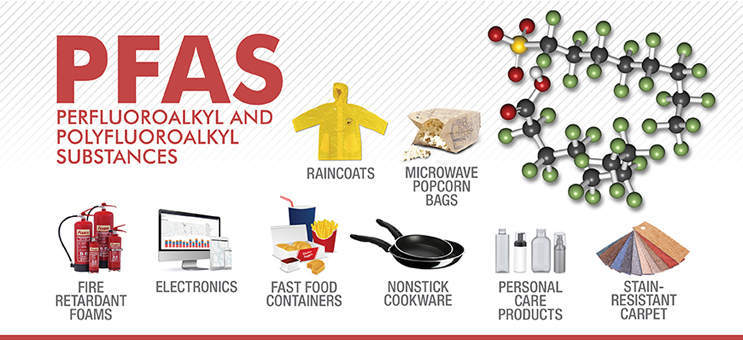California bans 'forever chemicals' from children's products, food packaging

Oct. 6 (UPI) -- California Gov. Gavin Newsom signed a pair of bills into law banning the use of toxic so-called forever chemicals in products for children and in disposable food packaging.
The Democratic governor signed the bills into law Tuesday regulating the use of perfluoroalkyl and polyfluoroalkyl substances, better known as PFAS, which are considered forever chemicals as they do not breakdown in the environment and present serious health concerns, such as cancer, fetal development issues and reduce vaccine effectiveness.
Assembly Bill 652, one of the laws Newsom signed Tuesday, goes into effect July 1, 2023, to ban the use of PFAS chemicals in children's products including pillows, changing pads, car seats and crib mattresses, among a slew of other products.
According the nonprofit, nonpartisan Environmental Working Group, PFAS coating on children's products sloughs off with wear and can be inhaled by children as dust particles or directly ingested through their mouths.
"Children are particularly vulnerable to harm resulting from PFAS exposure," David Andrews, senior scientist at EWG, said in a statement. "Many PFAS chemicals bioaccumulate and are found in the blood of almost all Americans, including babies and infants."
Bill Allayaud, EWG's director of California government affairs, said the new law places California in the lead of protecting children's health.
"We applaud Gov. Newsom for giving parents confidence that the products they buy for their children are free from toxic PFAS," he said.
The other legislation Gavin signed into law, Assembly Bill 1200, prohibits the forever chemicals from being added to disposable food packaging, utensils and papers straws staring Jan. 1, 2023, as well as requires cookware manufacturers to disclose the presence of all hazardous chemicals, including PFASs, on their labels from January of 2024.
"For the first time, cookware manufacturers must disclose on labels the chemicals present in the surface coatings of their products," Susan Little, EWG's senior advocate for California government affairs, said in a separate statement, adding that for too long consumers have been kept in the dark about the chemicals used in their cookware, which can enter the human bodies via the food they consume.
According to a report from the Ecology Center, 79% of cooking pans and 20% of baking pans were coated in these forever chemicals.
Food is a major source of exposure to these forever chemicals but Andrews said there is no reason PFAS need to be included in food packaging.
"PFAS can leach from packaging into food and they are toxic at incredibly low concentrations," he said.
Connecticut, Maine, Minnesota, New York, Vermont and Washington have all banned PFAS from food packaging.
The signing of the laws follow the U.S. Environmental Protection Agency in late April establishing a council to better understand and reduce the risk of PFAS.
https://www.mamavation.com/activism/california-bans-pfas-forever-chemicals-in-food-packaging.html

- Ban on Food Packaging: This new law bans the entire class of PFAS “forever chemicals” from food packaging, paperboard, utensils, and paper straws. The ban will go into effect on January 1, 2023.
- Labeling Transparency on Cookware Products: It also requires manufacturers to label cookware containing toxic PFAS chemicals on product handles or coatings by January 1st, 2024.
- Labeling Transparency Online for Cookware Products: In addition, cookware companies will have to make the chemicals used on the coatings of their pots, pans, and other cookware known on their websites beginning on January 1st, 2023,
- Restriction on Marketing for Cookware: Cookware companies are also restricted from using marketing terms like “PFOA-Free” if the cookware uses any other chemical from the PFAS class of chemicals, which will cut down on customer confusion.
- More Restrictions on Marketing for Cookware: Cookware companies are also banned from making false marketing claims that their cookware is “PFAS free” if it contains any chemical in the class of over 9,000 PFAS chemicals.
Several studies have been done over the years looking at the ubiquitousness of PFAS “forever chemicals” in food packaging and cookware.
- In 2017 a study was conducted on 400 fast-food wrappers & containers finding that more than half of the bread and dessert wrappers collected contained fluorine, which indicates PFAS “forever chemical” contamination. It was present in nearly 40 percent of sandwich and burger wrappers, and 20 percent of french fry paperboard.
- A study published in the journal Environmental Health Perspectives in 2019 looked at levels of PFAS in people who ate fast food versus those who ate home-cooked meals and discovered that after 24-hours, the people who ate from fast food consistently had increased amounts of PFAS in their blood than those who ate home-cooked meals.
- A study in Chemosphere in August of 2021 found that 36 out of 38 paper drinking straws that were tested and collected contained detectable levels of PFAS. This study also showed that when the straws were used, they transferred PFAS into the beverages or water as it traveled through the straws demonstrating human exposure.
- A report by the Ecology Center in 2020 found that 80 percent of cooking pans and 20 percent of baking dishes that were gathered and tested contained PFAS coatings. They also looked at the type of marketing that was used on these packages and some of the pans were marketed as not containing one type of PFAS chemicals when it contained other types. Thus demonstrating cookware companies were attempting to confuse the consumer into thinking they were completely safe.
Potential Health Effects of PFAS “Forever Chemicals” from Decades of Research
PFAS “Forever chemicals” have been linked with a long laundry list of medical problems and symptoms. Here are some of the most relevant findings for families to be wary of:
- reduction in immunity
- metabolic diseases like obesity & diabetes
- reduced vaccination response
- cardiovascular disease
- affect the growth, learning, and behavior of infants and older children
- increased risk of allergies & asthma in young children
- lower a woman’s chance of getting pregnant
- increase the chances of miscarriage
- increase cholesterol levels
- low sperm count
- smaller penis size
- increase the risk of cancer like testicular & kidney cancers
Investigations Mamavation Has Done Around PFAS “Forever Chemicals”
- Mamavation tested 12 ketchup products for indications of PFAS and reported on levels of products.
- Mamavation tested 8 bamboo flooring brands for indications of PFAS and reported on levels inside products.
- Mamavation tested 19 period underwear products for indications of PFAS and reported on levels inside the crotch of those panties.
- Mamavation tested 6 parchment paper products for indications of PFAS and reported on levels of that packaging.
Here’s some additional testing on indications of PFAS:

